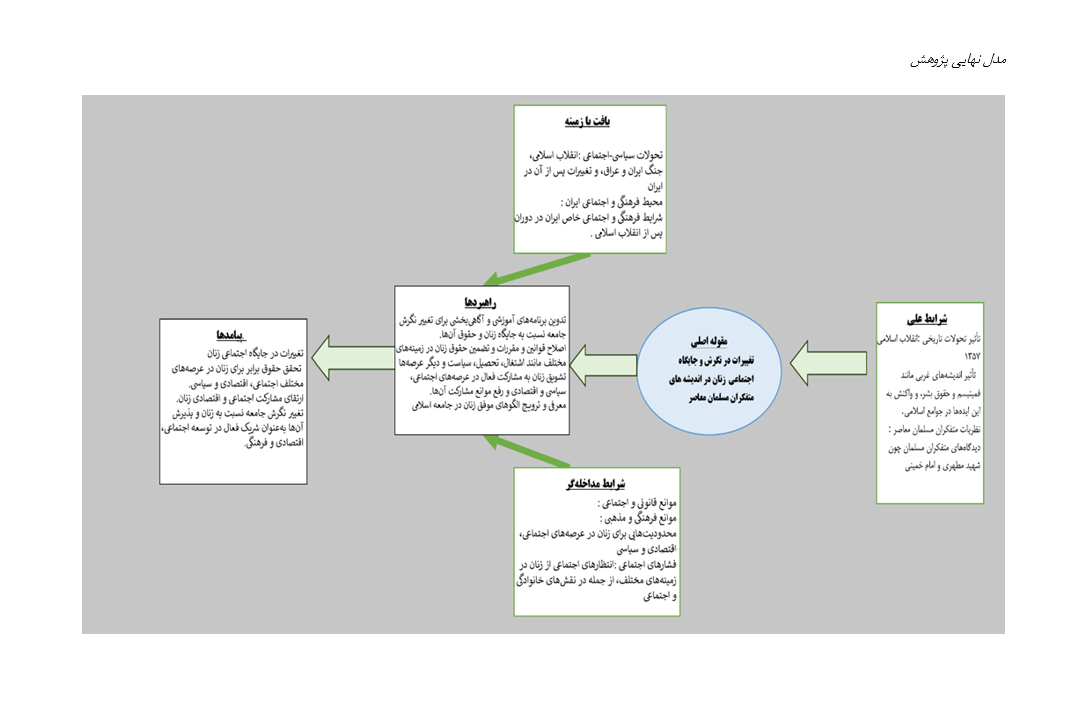The Evolution of the Concept of Women’s Social Identity in the Thought of Contemporary Muslim Thinkers
Keywords:
Social Identity, Muslim Women, Contemporary Muslim Thinkers, Grounded Theory, Qualitative Content Analysis, Conceptual TransformationAbstract
The present study was conducted with the aim of understanding the evolution of the concept of women's social identity in the thought of contemporary Muslim thinkers. The significance of this topic stems from the fact that female identity in Islamic societies has consistently been a contested domain among diverse interpretations of religion, tradition, and modernity, with its reflections influencing the social, cultural, and legal policymaking in Muslim societies. The research method is qualitative and based on the grounded theory strategy, which, inspired by the social actors’ approach, has engaged in content analysis of scholarly texts related to the views of contemporary Muslim thinkers. Sampling was carried out theoretically and continued until theoretical saturation was achieved. Data were collected through library studies and in-depth semi-structured text analysis, and analyzed using the three-stage coding model: open, axial, and selective coding. In this process, key concepts, relevant categories, and the relationships among them were identified and organized to formulate the final theoretical framework. To ensure the reliability of the coding, the intra-subject agreement method between two coders was employed. The findings of the research indicate that the evolution of the concept of women's social identity has emerged through the interaction of causal, contextual, and intervening factors and conceptual strategies in the thought of contemporary Muslim thinkers, and has been reflected in theoretical and social outcomes. This study, by providing an in-depth analysis of diverse perspectives on Muslim women, paves the way for designing indigenous and religious models aimed at women's empowerment and enhancing their social participation.
Downloads
References
Bandezadeh, K. (2003). Equality of Women and Men. Roshanfekran va Motale'at-e Zanan.
Fadlallah, M. H. (1999). The Role and Status of Women in Islamic Law. Dadgostar & Mizan.
Fadlallah, M. H. (2004a). Woman from Another Perspective. Amir Kabir International Publishing.
Fadlallah, M. H. (2004b). The World of Women. Sohravardi.
Ghoreishi, F. Reconstruction of Religious Thought in Iran. Ghasideh Sara.
Haddad Adel, G.-A. (2017). Encyclopedia and Encyclopedic Writing. Marja'.
Hakimpour, M. (2003). Women's Rights between Tradition and Modernity. Naghamah-ye Nowandish.
Hosseini Tehrani, M. H. (1984). Translation of the Treatise Badi'a on the Interpretation of the Verse "Al-Rijal". Hikmat.
Hosseini Tehrani, M. H. (1995). A Perspective on Soroush's Theoretical Expansion and Contraction of Sharia. Institute of Translation and Publishing of Islamic Sciences.
Karbalaei Nazar, M. (2020). Woman and the Recovery of True Identity: Selected Sayings of Ayatollah Khamenei. Islamic Revolution.
Khorramshad, M. B. (2003). Religious Intellectualism in Iran's Direction. Rahyaft-e Siyasi va Beynalmelali(4).
Khosropanah Dezfuli, A. (2017). Intellectualism and Intellectuals. Kānoun-e Andisheh-ye Javan.
Mehrizi, M. (2003). Women and Religious Culture. Hestinama.
Mehrpour, H. (2000). Discussions on Women's Rights (From National, Jurisprudential, and International Perspectives). Ettela'at.
Mirahmadi, M. (2004). Islam and Consultative Democracy [PhD Dissertation, University of Tehran].
Mojtahed Shabestari, M. (2004). Reflections on a Human Reading of Religion. Tarh-e No.
Mojtahedi Shabestari, M. (2002). Hermeneutics, Book, Tradition. Tarh-e No.
Sarparast Sadat, E. (2014). Transformations in Iranian Intellectuals' Understanding of Tradition and Crisis. Strategic Research on Politics, 11, 31-56.
Shahroor, M. (2016). The Book and the Qur'an: A Contemporary Reading. Dar al-Ahali.
Shams al-Din, M. M. (2003). Limits of Veiling and Gazing in Islam. Al-Hoda.
Zolfali, J., & Ghaffari. (2009). A Sociological Analysis of the Social Identity of Female Students at the University of Gilan. Journal of Youth, Culture, Society Research.

Downloads
Published
Submitted
Revised
Accepted
Issue
Section
License
Copyright (c) 2025 Maryam Kouchakzadeh, Khadijeh Zolghadr, Hadi Beygi Malekabad, Asemeh Ghasemi (Author)

This work is licensed under a Creative Commons Attribution-NonCommercial 4.0 International License.







